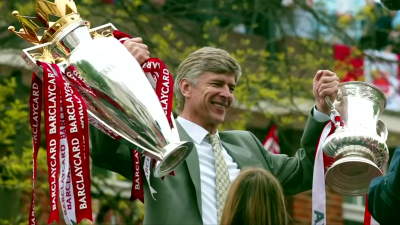Arsene Wenger

Image from: freelargeimages.com
Arsene Wenger
Current Club/Country: N/A.
Previous Clubs/Countries: Arsenal, Nagoya Grampus, Monaco, AS Nancy, Cannes.
Honours: English Premier League 1997/98, 2001/02, 2003/04. English FA Cup 1997/98, 2001/02, 2002/03, 2004/05, 2013/14, 2014/15, 2016/17. French Ligue 1 1987/88. French Cup 1990/91. Japanese Cup 1994/95. Japanese Super Cup 1995/96. English Charity/Community Shield 1998/99, 1999/00, 2002/03, 2004/05, 2014/15, 2015/16, 2017/18.
Wenger's time at Arsenal went through two definite periods in terms of style of play, he changed his tactics when Barcelona began to dominate and tried to emulate them. Before that his team was much more balanced. And more successful.
Initially he had pace and skill up front, but the defence and midfield had power and solidity, it was not about ball possession then for Wenger. His teams were about a solid base and a quick break, the ball was moved quickly from back to front, though it was not lacking in skill or excitement.
Then it was about attacking the opponent as fast and hard as possible, not giving them time to organise their defence, moving the ball quickly, both forward and to the wings, where the space was. Players were given freedom to play and enjoy their game, but also expected to work hard for their team-mates.
Defending was down to having good defenders, well positioned, and strong midfielders, such as Petit and Vieira, to break up the play in front of them. Attacking was about hitting the space with the ball and also allowing skilled forwards to run with the ball and cause havoc.
Later, when Barca became dominant, Wenger tried to copy their style and to put a team of ball players together, looking to defend by keeping hold of the ball and not allowing the opposition to have it. The mantra defensively was 'if they don't have the ball, they can't score', but it required a lot of changes.
Gone where the power and pace midfielders, who could drive forward with the ball, instead where small, clever players, who could pick a pass and excelled at ball retention. Even the defenders were judged as much by how comfortable they were in possession as by their ability to defend.
It did not bring the same success because it is impossible to keep the ball for 90 minutes and the team was so focused on ball retention, it was all at sea when it needed to defend. They could be brilliant when in possession but inept when they lost it, almost like a Keystone Cops scene.
The focus in training was too heavily on ball retention and not enough was done on shape and defensive drills. Added to that, the players were easily bullied, with no Vieira or Petit or Adams to stand up and protect the small, clever players in midfield.
Added to the change in tactics, Wenger had lost the other edges he had possessed initially. No longer was he ahead of the game when it came to nutrition and fitness, as he had been when he arrived from Japan, to an English game that was years behind the rest of Europe. Backward even in many aspects of professionalism.
Everybody had picked up on his techniques and, by the end of his time, most had moved on past him, making him the one that was years behind the rest. Wenger also no longer had an advantage in recruitment, as everyone was looking into the markets he once had to himself.
Added to that, he was no longer able to change games via substitutions or tactical tweaks to the same level he once did. A large part of that being down to the players he had on the bench being much the same as those already on the pitch, so there was little different he could do to change things up.
In essence, Wenger is a story of the sportsman who stayed too long, like a champion boxer who has one fight too many and, though he has lost his edge, then has another and another, trying desperately to recover that edge. It never comes back though, you just end up overshadowing your glory years with your final years if you are not careful.
Requested by